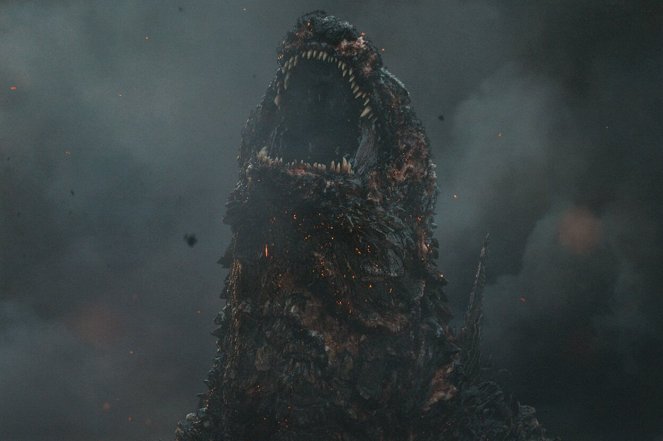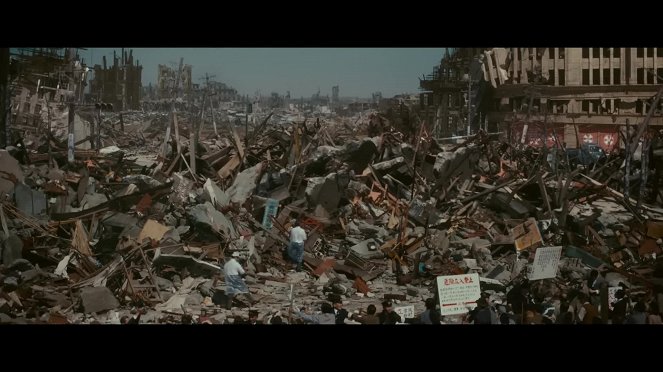Réalisation:
Takashi YamazakiScénario:
Takashi YamazakiPhotographie:
柴崎幸三Musique:
佐藤直紀Acteurs·trices:
Ryūnosuke Kamiki, Minami Hamabe, 山田裕貴, 青木崇高, Hidetaka Yoshioka, Sakura Andō, Kuranosuke Sasaki, Miō Tanaka, Yûya Endô, 飯田基祐, Sae Nagatani (plus)Résumés(1)
Le Japon se remet à grand peine de la Seconde Guerre mondiale qu’un péril gigantesque émerge au large de Tokyo. Koichi, un kamikaze déserteur traumatisé par sa première confrontation avec Godzilla, voit là l’occasion de racheter sa conduite pendant la guerre. (Orange Cinéma Séries)
Vidéo (12)
Critiques (10)
Les lamentations répétitives du personnage principal au sujet de ses traumatismes et de ses remords deviennent ennuyeuses à la longue, mais le ton lugubre de l’effondrement de la situation du Japon dans la guerre ajoute beaucoup au monstre gigantesque. Sur fond de musique sombre et inquiétante, Godzilla symbolise ici les horreurs de la guerre, y compris la menace nucléaire dévastatrice. Les scènes océaniques avec le monstre sont excellentes, avec une montée en puissance et des idées pour exploiter au maximum ses capacités physiologiques. Il est effrayant, en colère et indestructible. Les scènes avec Godzilla en ville ne sont que secondaires, comme si les producteurs n’avaient pas voulu répéter ce qui a déjà été vu des centaines de fois (même dans des films de monstres américains) et avaient souhaité conserver la spécificité aquatique et maritime de l’histoire. Le budget de 15 millions de dollars pour un tel déluge d’images de synthèse de haute qualité est tout simplement incroyable, et le succès du film dans les salles américaines pourrait marquer un changement dans l’état d’esprit des comptables d’Hollywood quant à ce dont un bon film a besoin, et ce dont il n’a pas besoin. À cet égard, Godzilla Minus One est un « phénomène transformationnel » de cette année, tout comme l’était Barbenheimer.
()
Gojira as a serious war drama? Yes, a return to the classic roots of the first two episodes. It's a terrible shame that most people associate the brand with Hollywood's Monsterverse, or that goofy Emmerich flick with Jean Reno that had nothing to do with Godzilla. They have no idea about the Godzilla phenomenon in the country of its origin, Japan, where TOHO has made a total of 29 feature films starring the overgrown lizard across six decades. Sure, the SHOWA era in the 50s and 60s in particular was very cringe, with Godzilla facing aliens and a monkey and making friends with a little Japanese boy. But this latest installment, essentially an homage, is a return to the rawness of the first two films from 1954 and 1955. Gojira is no pet this time, but a fierce creature happy to bite people in half and throw trains through the air. I was surprised by the screenwriting focus on human characters. Basically the entire first half doesn't leave the setting of the slums on the outskirts of Tokyo, dealing with a sort of small family micro-story, with a momentary detour to the sea, where the mines left behind are being fished out at the cost of their lives, only to have Godzilla start destroying the city after an hour or so, with a familiar musical theme from the TOHO films that brought a smile to my face. There are four action sequences in the film with each one getting better and better. It's unbelievable that this film cost less than Jákl’s Jan Žižka, yet it has the parameters of a big budget film, and by alternating the closed micro environments of one room with lavish CGI scenes, it very cleverly masks its budgetary constraints. Also, fans of the franchise will find references to old standbys, with Gojira's luminous shell playing a major role in this regard. There's also a noticeable sense of the lingering post-war and Hiroshima trauma of the Japanese in the film, just as you'd sense in the old films. It's a great homage, and if it is a reboot, I love it to.
()
World War II is over, but Japan is far from finished, for a gigantic monster is approaching its shores. Will it be stopped, or will it make the decimated country fall to the bottom? Godzilla -1.0 is a showcase of great-looking destruction, functional pathos and slightly over-the-top Japanese acting. All in all, though, it's an easily watchable film even for a European, the makers of which have enough enthusiasm, ideas and respect for the original films to make those two hours in the cinema a great time.
()
This year, it seems to me that perhaps all the films around which there is general hype seem to be slightly above average at best, and Japan's Godzilla -1.0 is another one of those. As long as it deals with the intimate fates of individuals in post-war Japan and the lizard is only seen in waves, it's fine. Once the lizard makes landfall, the Japanese get a chance to use their over-the-top acting, and the characters start hatching crazy plans, but it in the end it turns that the lizard is enough (... well, you'll see), so it goes down the tubes, at least for me. I can appreciate how it looks given its budget, but I can't enjoy it authentically.
()
A return to the roots of a monster that grew out of traumatic guilt, a feeling of failure and the rise of the atomic age, which Japan felt on its body like no other nation. Yamazaki and co. have filmed an organic blend of post-war family drama and Jaws on steroids, making clever and aesthetically economical use of their limited budget. Even though those limits are perceptible, they are always in service of the whole, which is both intimate and epic at the same time. Godzilla Minus One is the kind of blockbuster that Gareth Edwards tried to make, i.e. unencumbered by compromises and pressure from the studio. It is depressing and uplifting, naïve and touching. Everything that I require from a blockbuster!
()
Photos (23)
Photo © 2023 TOHO CO.,LTD.



Annonces